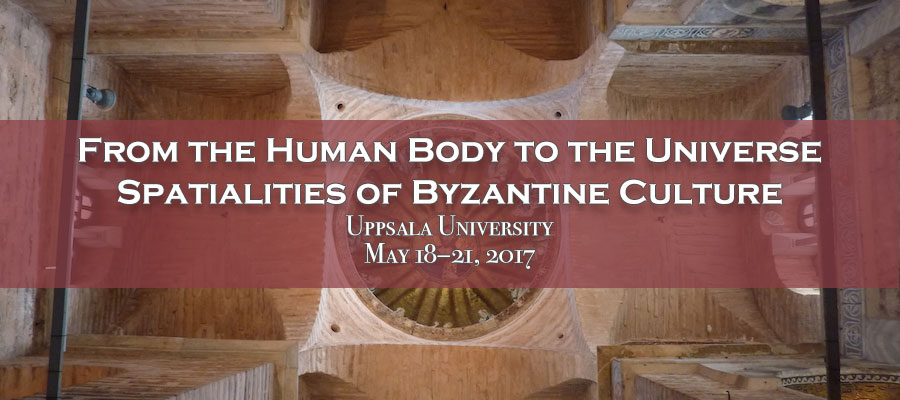From the Human Body to the Universe: Spatialities of Byzantine Culture, Uppsala University May 18–21, 2017
Space Matters!...
The injunction to historicize space has not always been on the agenda of researchers in Byzantine Studies. Traditionally, philologists, archaeologists, historians and art-historians have been tempted to take space for granted. And yet, within the recent Spatial Turn in the humanities and the social sciences, research on spatial paradigms and practices has been expanding, gaining great attention across disciplines and vastly different periods. In this context, space has been attributed a complex involvement in historical developments, as a comprehensive concept constituted by the integration of absolute and relative, relational and materially-sensed, physical and social, conceptualized and lived space. An engagement of Byzantinists with these ways of thought and action opens up an entire new set of possibilities for understanding the Byzantine world.
Spatialities of Byzantine Culture
Many cultural aspects speak for the crucial importance of spatialities for the Byzantines. Their bodies and minds are performed as their most personal spaces of social identity and control. These bodies interact with their natural environments in their struggle to survive and create, thus producing their spatial experiences. In that way they construct their own culturally appropriated spaces, producing Byzantine landscapes. These landscapes are dominated by power relations, which divide them into territories, and performed by cultural practices. Passing from the body to the mind, imaginary spaces host moments of a universe of heaven and human passions. How are all these Byzantine spaces relevant to us, today, and in what ways can we understand them? These are the main issues addressed by this conference.
We are welcoming abstracts which interrogate the various understandings of space in Byzantine culture, those which present new methodological approaches to the topic, and case studies which are placed within a wider theoretical context from all fields of Byzantine Studies (history, archaeology, philology, art history, museum studies etc).
The papers should refer to one of the following broad thematic panels:
- The (most) Private Space: the body as topos
- Natural Spaces: Byzantine environments
- Experienced Spaces: human bodies within the natural environment
- Anthropogenic Spaces: Byzantine landscapes
- Empowered Spaces: Byzantine territories
- Performed Spaces: the spatiality of cultural practices
- Imaginary Spaces: Byzantine story worlds
- Representations of Byzantine Spaces, now and then
Possible topics may touch upon, but are not limited to, the following areas of research:
- Byzantinists and Space: methodological and theoretical approaches in history, archaeology, art histroy and philology
- Representations of space
- Going Global: linking local, regional, national, transnational Byzantine histories
- Symbolic geography and cultural spaces: for example ‘Byzantium, ‘Asia Minor’ or the ‘Balkans’, the ‘Levant’, the’West’ and the ‘Orient’, etc.
- The spatial constitution of politics: the empires and neighbouring states (territoriality, kinship)
- Economic history: economic systems, ‘core’ and ‘periphery’
- Spatial dimensions of everyday life: approaching gender, ethnicity, class, religion
- Urban spaces (morphology, planning; spaces of production, consumption and exchange, urban/rural divides)
- Geographies of knowledge: production and transfers
- Space and Memory.
The working languages of the conference will be English and French.
